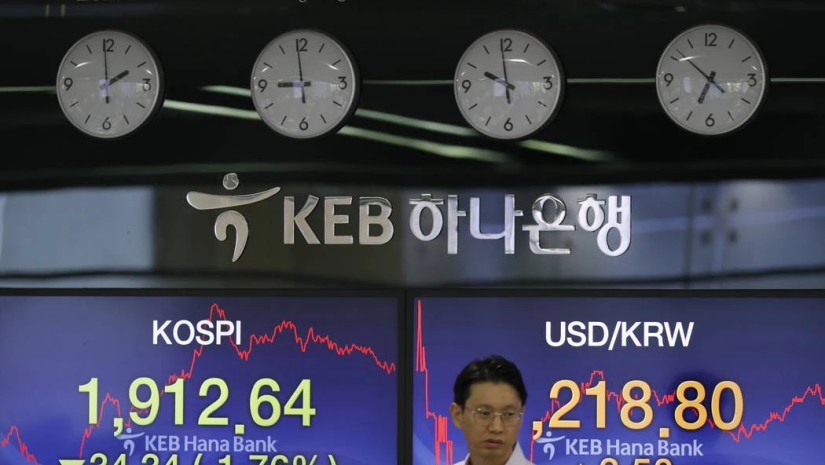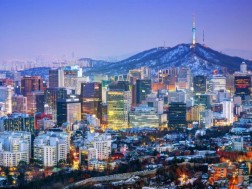South Korea’s economy is expected to rank eighth in the world this year, with its gross domestic product (GDP) reaching $1.7 trillion, indicating its pivotal role in the global economy and world order.
South Korea is one of the world's largest economies, making its stock market, particularly the KOSPI (Korea Composite Stock Price Index), a major player in the global financial landscape. The country is increasingly the global leader in the industries of the future including AI and EV as well as creative industries and cultural exports.
Global investors can get exposure through KOSPI listed stocks and country ETFs.
Korea Kospi index currently trades at 16x P/E and a dividend yield of 1.96%. South Korea year-to-date underperformed Japan by -11% but outperformed China equities by+20%. Year-to-date, EWY south Korea country ETF underperformed global equities URTH by-6.89%. Koreans at times referred to their country as a shrimp among whales that is the much larger countries of China and Japan.
China and Japan and their relationship with the United States will increasingly influence south Korea economy and Korean equities.
The South Korean stock market is heavily influenced by its technology sector, with companies like Samsung Electronics being major players in the global tech industry. The performance of these companies often has a ripple effect on global technology-related equities.
Medium term the South Korea's economy is grappling with sticky inflation, weak growth, and high debt - a mix that creates a policy dilemma for BOK Bank of Korea, the central bank. Inflation dynamics are still challenging even after 300 basis-points worth of rate hikes by the Bank of Korea since August 2021. Meanwhile, growth is weaker than the central bank anticipated due to soft external global demand. Increasing household debt, already the world's third highest relative to GDP, is raising concern about risks to financial stability. South Korea's preliminary GDP report showed growth momentum recovered in the second quarter. GDP grew 0.6% compared with 1Q, when it rose 0.3%.
South Korea full year GDP growth is estimated at 2.1% for 2024 and 2.3% for 2025.
Korea once called the hermit kingdom is now focusing on more foreign immigration
South Korea increasingly turns to migrant labour to fuel growth with falling birthrate, country widens range of jobs filled by foreign workers
South Korea, a country with strict immigration laws, has accepted temporary foreign workers since the 1990s to address shortages in fields with gruelling hours and low pay, particularly manufacturing and agriculture. But now the South Korean government is making workers like Jayantha a bigger part of its vision for the country's economy. The administration of President Yoon Suk Yeol is moving to significantly increase the number of incoming foreign workers and the range of jobs they can do, as the country looks to address labour shortages and boost economic growth.
South Korea or ROK (Republic of Korea) at times has been called republic of Samsung.
Blue chip and iconic south Korean company Samsung electronics trades at 13x P/E and a dividend yield of 2.11%. Current analyst consensus ratings stand at BUY 95.6% and hold 4.4% with SELL recommendations at 0%. The 12-month fundamental analyst target price on the stock of KRW 91,600 implies(potential) return of 33% from current levels.
Taiwan TSMC and Korea’s Samsung Electronics could continue to top chipmaker capex through 2032. TSMC's capex might reach $59.5 billion by then (23% of the total) assuming its sales grow 8.4% a year over 2022-32, with its CI reaching 35% in 2032. Samsung Electronics' capex may hit $52.2 billion (20% of the total) with a CI of 40%, equal to its 2014-23 average, if its chip sales grow by an annualized 5.5% in the preceding decade.
Half a century ago, South Korea was one of the poorest countries on the planet, and nobody would have predicted that it would conjure up an economic miracle. In 1960, the country’s per capita gross domestic product (GDP) was $158 slightly less than Ghana’s. Next year, South Korea’s GDP per head in PPP terms is forecast to stand at $44,530. Today greater Seoul is one of the largest agglomerations on the planet. If you do not count city-states, Korea is the 3rd most densely populated country in the world.
North and South Korea combined have a combined population of close to 75 million people, which means should they ever unify the nation would be almost as big as Germany. South Korea on its own would be the 5th largest, was it a member of the European Union.
In the investment world, South Korea is often used as an indicator of future developments in the global economy because its industrial composition simply puts it ahead of the curve. Due to this, some investors were pricing in a certain degree of "excess risk" in South Korean equities valuation.
South Korean macro indicators are often used in global composite leading indicator models (because of Korea's very cyclical industries such as autos and semiconductors).
Last year, South Korea’s stock exchange operator Korea Exchange (KRX) became the fifth-biggest exchange-traded fund (ETF) market in the world.
At the end of last year, Korea Exchange had 2,409 listed companies with a combined market capitalization of KRW 2,314 trillion (USD 2.1 trillion).
KRX ranking fifth following the New York Stock Exchange, Nasdaq, Shanghai Stock Exchange, and Chicago Board Options Exchange. KRX’s ETF transactions accounted for 1.6 percent of the global ETF trade volume. The growth has been driven by the increase in popularity of thematic ETFs that invest in future-promising industries including cloud, electric vehicles, secondary batteries, and bio.
Already in 2015, the Korea Exchange joined the United Nations Sustainable Stock Exchanges initiative under the guidance of Korean-born United Nations Secretary-General Ban Ki-moon.
South Korea accounts for 12.8% of the MSCI Emerging Markets Index, second to China at 40.7%.
Historically, some global investors referred to South Korea as the republic of Samsung.
Today, Samsung is a massively diversified and powerful company accounting for approximately 15% of Korea’s total GDP. Samsung has helped put Korea on the world stage and made it a prosperous economy and growing awareness that these companies are Korean.
As of October 2023, Samsung has a market cap of $331.36 Billion. This makes Samsung the world's 24th most valuable company.
Samsung Electronics has announced that it ranked seventh out of 200 companies in the World Benchmarking Alliance (WBA)’s 2023 Digital Inclusion Benchmark.
Only 3o years ago, however some global consumers thought of Samsung, LG formerly Lucky-Goldstar, and Hyundai motors though to be Japanese and the Korean companies did not make a great effort to correct the impression for the simple reason that they did not wish their brands to be dragged down by association with the motherland.
Since 1995 South Korea’s Samsung electronics share price has outperformed Sony Japan’s stock price by + 3.169%.
Family-run conglomerates still touch almost every aspect of life in South Korea. But there are signs of change: self-made fortunes are emerging from new economy sectors such as e-commerce, entertainment, and gaming.
When I started out in the investment business in the mid-1990s, emerging markets were still often viewed as the “dark corners” of the global economy.
Ironically, MSCI still classifies South Korea as an emerging market, although it’s a world leader in the tech industries and boasts a vibrant democracy that has handled the coronavirus pandemic better than many western nations. The broad EM label seems to have reached the stage where the term might be more of an obstacle, rather than an inspiration for a wise investment.
According to the journal of portfolio management, fund managers and investors making portfolio allocation decisions have historically considered emerging market equities as a separate asset class. More recently, a number of economic, legal, accounting, and financial developments have eroded the root differences between emerging and developed country financial markets.
South Korean equities classified as EM have suffered a so-called “ Korea discount,” the amount by which intuitional investors undervalue Korean stocks. Two of the main reasons for this are the tensions between North and South Korea, and corporate governance.
This equity premium discount rate can be seen in how Korean stocks have consistently maintained low price-earnings ratios. South Korea was perceived to have certain long-term investment risks that need to be addressed and compensated for. However, the Korean discount has significantly eased in recent years.
K-pop and media content increasingly are new Korean equity market drivers/narratives. The size of Korea’s content industry is small relative to the vast industrial manufacturing sector but has been growing steadily. Content exports totalled $10.8 billion last year, roughly one-tenth of chips -- Korea’s main cash cow -- but already earning more than some other key export items such as household appliances and cosmetics. The value of Korea’s entertainment exports, which include publishing, games, music, movies, and TV shows, rose 6.3% last year even as overall shipments of goods fell 5.4% due to the pandemic. Even consumer products related to the so-called Korean wave, such as cosmetics, clothes, and food items, rose 5.5% last year, according to a report by the Korea Foundation for International Cultural Exchange.
While near-term risks remain in global supply chains and logistics, the South Korean won is probably undervalued against the US dollar at about 1,350 levels. South Korea Earnings Volatility is expected to Decrease next year.
Korean President Yoon Suk Yeol recently wrapped up a state visit to Saudi Arabia and Qatar aimed at expanding business opportunities South Korean companies in the Middle East. Saudi Arabia and Qatar have been pushing to move their countries away from an oil-centric economy through ambitious projects to develop smart cities and build knowledge-based, high value-added industries.
That presented an opportunity for South Korean businesses to expand their cooperation beyond the traditional areas of energy and construction to new sectors, including the defence industry, cutting-edge technologies, shipbuilding and culture. giving rise to hopes of a second Middle East business boom following the wave of construction orders won by South Korean companies in the 1970s. South Korean equities are very important to monitor in terms of gauging where global equities are headed next, whether the global economy is stabilizing or still slowing.
By Rainer Michael Preiss, Partner & Portfolio Strategist at Das Family Office in Singapore.















